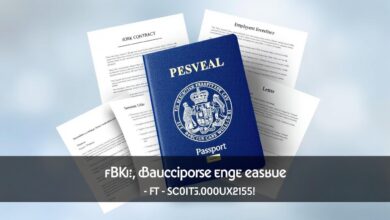Visa Sponsorship in Germany: What Skilled Workers Need to Do to Apply Successfully
Visa sponsorship in Germany is key for skilled workers, especially from Nigeria, wanting to work in Europe.
Anúncios
It’s important to know the steps and requirements for a skilled worker visa in Germany. This guide will help you understand visa sponsorship in Germany and how to get a work permit.
Overview of Visa Sponsorship in Germany
The visa process in Germany is key for bringing in skilled workers. Visa sponsorship means an employer helps a non-EU citizen get the visa needed to work in Germany. The employer must show the job can’t be done by a local and that the foreign worker meets the requirements.
You will be redirected to another website
Definition of Visa Sponsorship
Visa sponsorship is when an employer backs a foreign national’s work visa application. This lets the employee legally work and live in Germany. The employer provides the needed documents and proves the foreign worker’s skills are needed.
Importance of Visa Sponsorship for Skilled Workers
For skilled workers, getting a visa sponsorship is vital. Without it, they face big legal hurdles and fewer job chances in Germany. Employers are cautious about hiring without sponsorship due to the visa process’s complexity.
The demand for skilled workers is growing in Germany. Visa sponsorship helps attract global talent. With the right support, skilled immigrants can fill key roles, boosting Germany’s workforce and economy.
Eligibility Criteria for Skilled Workers
Skilled workers from Nigeria looking to get a visa in Germany must meet certain criteria. Knowing these rules can help improve your chances of getting a work permit. Key factors include the right qualifications, language skills, and age limits.
Required Qualifications and Experience
To qualify, you usually need degrees or certifications that match your job. Also, having work experience in a similar field helps a lot. Employers look for candidates with real-world skills and experience.
Language Proficiency Requirements
Speaking German or English well is very important for job seekers in Germany. It helps you communicate better and get hired. Many jobs require a certain level of language skill. So, it’s key to prepare for language tests to show you’re proficient.
Age Restrictions
Age can affect your chances of getting a work permit in Germany. People between 18 and 35 usually have an easier time getting visas. This is because younger workers can stay in the job market longer.
Types of Visa Available for Skilled Workers
Skilled workers looking to work in Germany have many visa options. Knowing about these visas can help a lot with their job search. Here are three main types of visas for skilled workers.
EU Blue Card
The EU Blue Card Germany is for highly skilled people from outside the EU. It lets you work in many EU countries and gives residency rights for family. To get it, you need a recognized degree, a job offer with a certain salary, and health insurance.
This visa is more than a work permit. It’s a way for skilled professionals to make Germany their home.
Recognition of Foreign Qualifications
Getting your foreign qualifications recognized is key for skilled workers. It means your education and work experience match German standards. Getting recognition can open more job doors for you.
There are different places in Germany that handle this. Make sure you have all the right documents ready to avoid delays.
Job Seeker Visa
The Germany job seeker visa is for finding work in Germany. It lets you live there for up to six months to look for jobs that fit your skills. You need to show you have enough money for living and professional qualifications.
This visa is a big step for those who want to work in Germany. It’s a chance to find a job and then apply for a work visa.
Application Process for Visa Sponsorship
Understanding the visa application process in Germany is key for those applying for a skilled worker visa. This guide will help you through the steps, from getting a job offer to submitting your documents.
Step-by-Step Application Guide
To apply for a Germany skilled worker visa, start by getting a job offer from a German employer. Then, follow these steps:
- Prepare the documents you need to submit.
- Fill out the visa application form.
- Book an appointment at the German embassy or consulate.
- Submit your application and documents.
- Wait for your application to be processed.
Required Documentation
You’ll need to provide several documents for your visa application. Here are the main ones:
- A valid passport for at least six months.
- A job offer letter from a German employer.
- Educational certificates and transcripts.
- Proof of work experience.
- Language proficiency certificates, showing you can speak German.
Timeline for the Application Process
The time it takes to apply for a visa in Germany varies. Generally, you can expect:
- 1-3 weeks to prepare your documents.
- 2-4 weeks for the visa application to be processed.
- 1 week to get your visa approval after processing.
The whole process can take 1 to 3 months. So, it’s best to plan ahead.
Finding Employment in Germany
For skilled workers looking for jobs in Germany, a smart job search plan is key. Knowing how to search for jobs can make a big difference. Networking and using online job sites are important steps. Here are some tips to help you find a job.
Job Search Strategies for Skilled Workers
Skilled workers should use these strategies when looking for jobs in Germany:
- Tailor CV and Cover Letters: Make your application stand out by customizing it for each job.
- Participate in Job Fairs: Job fairs are great for meeting employers and learning about job openings.
- Join Professional Associations: These groups often have job listings and benefits for members.
- Leverage LinkedIn: A good LinkedIn profile can attract recruiters and help you connect in your field.
Networking Opportunities
Networking is key for skilled workers in Germany to find jobs. Making connections in your field can give you insider info on jobs and company culture. Here are some ways to network:
- Attending Industry Conferences: Talking to professionals at conferences can reveal jobs not advertised online.
- Utilizing Alumni Networks: Your alma mater’s network can offer job leads and advice.
- Participating in Networking Events: Events in your field can help you meet important people.
Utilizing Online Job Portals
Online job sites are a great way for skilled workers to find jobs in Germany. Here are some top sites to check out:
| Job Portal | Specialization | Key Features |
|---|---|---|
| Indeed | General | Wide range of job listings, company reviews. |
| Professional Networking | Focus on German-speaking jobs, networking tools. | |
| StepStone | Various Industries | Detailed job descriptions, easy search filters. |
| Monster | General | Job matches based on your skills, resume help. |
By using these strategies and online resources, skilled workers can improve their job search in Germany. This will help them find their way in the job market.
Role of Employers in Visa Sponsorship
Employers play a key role in visa sponsorship for skilled workers in Germany. They offer jobs and handle big responsibilities for a smooth process. Knowing these duties helps both employers and job seekers with visa applications.
Employer Responsibilities
Employers must follow labor laws and show they can support the visa. They have to:
- Give a clear job offer with details of the role.
- Make sure they meet German labor rules and standards.
- Help with the visa application by providing needed documents.
- Keep records of the employment contract and the employee’s status.
Importance of Employer Sponsorship
Employer sponsorship is very important. It makes it easier for skilled workers to get visas. When employers help with sponsorship, it leads to:
- Both parties understand immigration laws better.
- More trust and commitment between employer and employee.
- Easier entry into the German job market for candidates.
How to Approach Potential Employers
It’s important to have a plan when talking to potential employers. Candidates should:
- Look for companies that hire internationally and sponsor visas.
- Customize resumes and cover letters for the German job market.
- Get ready for interviews by knowing what the employer expects about sponsorship.
Cost of Living in Germany
Understanding the cost of living in Germany is key for skilled workers moving there. This section covers essential expenses like food, transportation, and utilities. Knowing these costs helps with budgeting and adjusting to the new place.
Overview of Living Expenses
Living costs in Germany vary by region. Cities like Berlin, Munich, and Hamburg have higher prices. On average, skilled workers can expect to spend:
- Groceries: About €250-€400 a month
- Transportation: Around €80-€120 for public transit
- Utilities: Usually €200-€300, covering electricity, heating, and water
Housing Costs
Housing costs are a big part of living expenses in Germany. Rent prices vary a lot by region:
| City | Average Monthly Rent (€) |
|---|---|
| Berlin | 1,200 |
| Munich | 1,500 |
| Frankfurt | 1,300 |
| Hamburg | 1,200 |
Healthcare and Insurance
Germany offers good healthcare, but you need insurance. It’s important to get health insurance, which costs €80 to €400 a month. This depends on the plan you choose. Understanding these costs and the healthcare system is crucial for a smooth move.
Integration into German Society
Settling in Germany is more than getting a visa and a job. Help for immigrants is key to adjusting well. This aid focuses on learning the language, understanding the culture, and joining the community.
Language Courses and Support
Speaking the language is crucial for talking and connecting with others. Many places offer language classes for newcomers. These include government-funded courses, private schools, and community lessons.
These classes teach German and also about the culture. This helps people in their work and personal lives.
Cultural Adaptation Resources
Getting used to a new culture is tough. There are many resources for immigrants in Germany. Workshops, webinars, and sessions cover work habits, social rules, and local traditions.
Knowing these helps newcomers fit in better. It also helps them feel like they belong.
Community Support Networks
Local groups can really help with integration. Many organizations and groups help immigrants. They offer mentorship, social events, and share information.
These networks help newcomers and long-time residents connect. They share experiences and knowledge. This makes the move to Germany easier.
Frequently Asked Questions (FAQs)
Nigerian skilled workers often have questions about the visa application process. It’s important to clear up common questions about Germany’s skilled worker visa. This helps applicants feel more confident when looking for work in Germany.
Common Concerns of Nigerian Skilled Workers
Nigerian skilled workers have many worries when thinking about visa sponsorship. They often ask:
- What are the basic requirements for a skilled worker visa?
- How long does the application process take and can it be delayed?
- Are their qualifications recognized in Germany?
- What are the financial costs and do they need a job before applying?
Clarifying Misconceptions About the Visa Process
Many myths surround the visa process, causing confusion. Some of these myths are:
- The belief that a job offer is needed before applying for a visa.
- The assumption that the process is very long and hard.
- The idea that qualifications from outside Germany are not valid.
- The belief that speaking German is not important for work.
It’s key to answer these common questions and clear up visa process myths. This helps Nigerian skilled workers. Knowing the right information can make their application process smoother.
Additional Resources for Applicants
For skilled workers wanting to move to Germany, the right resources can make a big difference. Government websites offer official immigration help. They keep applicants updated on visa rules and how to apply.
These sites also let you check your application status. This makes the immigration process clearer and easier.
Support groups in Nigeria and Germany also help a lot. They offer legal advice, job help, and programs to help newcomers settle in. These groups provide valuable insights and practical support.
Using the Germany skilled worker guide and support services can help skilled workers succeed. Getting the right information and advice is key to dealing with immigration and reaching career goals in Germany. These resources are vital for a smooth and successful immigration journey.
FAQ
What is the process for obtaining a skilled worker visa in Germany?
To get a skilled worker visa in Germany, start by finding a job in Germany. Your employer must sponsor your visa. Then, collect your qualifications, work history, and language skills.
After that, apply for the visa at a German embassy or consulate. If approved, you’ll get your work permit and can move to Germany.
What are the eligibility criteria for skilled workers looking to immigrate to Germany?
To immigrate to Germany, skilled workers need certain qualifications. These include a degree, work experience, and language skills. You must also be of a certain age and financially stable.
How can skilled workers find job opportunities in Germany?
Skilled workers can find jobs in Germany online or at job fairs. Networking on social media and joining professional groups helps too. These strategies can increase your job search success.
What types of visas are available for skilled workers in Germany?
Germany offers several visas for skilled workers. There’s the EU Blue Card for top talent, a Job Seeker Visa, and a visa for validating foreign qualifications. Each visa has its own rules and benefits.
What are the responsibilities of employers sponsoring skilled workers in Germany?
Employers must follow labor laws and get the right visa documents. They also need to financially support the worker’s move. This includes verifying job offers and helping with workplace integration.
How much does it cost to live in Germany as a skilled worker?
Living costs in Germany vary by region. Skilled workers need to budget for housing, food, healthcare, and transport. Cities like Munich are more expensive than smaller towns. Researching costs is crucial for financial planning.
What resources exist for skilled workers new to Germany?
Many resources help skilled workers in Germany. There are community networks, language courses, and cultural programs. Government sites offer visa info, and job placement organizations help with integration.
Are there age restrictions for skilled worker visas in Germany?
Germany doesn’t have age limits for skilled worker visas. However, younger applicants might find it easier to meet requirements. Always check immigration policies to ensure you’re eligible, regardless of age.
Published on: 11 de April de 2025

Arturo González
Arturo González is the founder and lead writer of DebxCred.com, a platform created to help people make smarter and more informed financial decisions. With a degree in Business Administration and a specialization in Financial Marketing, Arturo built a solid corporate background before deciding to share his knowledge in a practical, easy-to-understand way.
Driven by a genuine passion for finance and education, Arturo turned DebxCred.com into a trusted source for detailed reviews of financial products, digital banking tools, and practical financial education — empowering readers to take control of their money with confidence.
In his free time, Arturo finds balance and inspiration while surfing — a hobby that reflects his calm yet determined approach to helping others build a healthier and more prosperous financial life.






